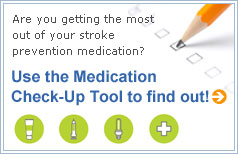|
I want to learn more about Stroke risk reduction I have atrial fibrillation (AFib) and want to learn more about stroke risk reduction I have high blood pressure and want to learn more about stroke risk reduction I have high cholesterol and want to learn more about stroke risk reduction I have diabetes and want to learn more about stroke risk reduction I have had a stroke or TIA ("mini-stroke") and want to reduce the risk of another stroke 
Talking to your doctorWorking with your doctor is an important part of managing your risk of stroke. Be prepared and learn how to talk to your doctor. Why is stroke risk reduction so important for people with AFib?Learn more about strokes, stroke causes, why strokes are more likely in people with AFib, and why it's so important to reduce your risk.
What is a stroke?A stroke is a sudden interruption of blood flow to the brain. Without the oxygen and nutrients carried by the blood, brain cells begin to die. The longer blood flow is interrupted, the greater the risk of permanent brain damage and death. There are two common types of stroke:
Depending on the part of the brain affected, strokes can affect your vision, mobility, thoughts, memory, and speech. See "How could a stroke affect my health and lifestyle?" to learn more. Some people may have a "mini-stroke," also called a TIA (transient ischemic attack). With a TIA, the blood flow to the brain is temporarily blocked. A TIA causes the same symptoms as a stroke, but the symptoms usually disappear within 24 hours. However, a TIA is still very serious because it could still cause brain damage, and because it is a warning that you are at risk of a stroke. What is AFib?AFib, or atrial fibrillation, causes an irregular heartbeat. It the most common type of irregular heartbeat, affecting about 350,000 Canadians. Here's how the heart normally works: The heart is a large muscle with 4 chambers: the top chambers are called the atria and the bottom chambers are called the ventricles. Normally, the atria and ventricles work together. First the atria contract (this means that the muscle squeezes) and pump blood into the ventricles, then the ventricles contract and pump blood through the body. This process is controlled by electrical signals in the heart. Normally, the atria pump regularly with a constant rhythm. Here's what happens with atrial fibrillation: The heart's electrical signals become disorganized, and the atria don't contract in a regular rhythm. Instead they quiver or contract in an unpredictable way, which means that the heart pumps less efficiently. The heartbeat becomes rapid and irregular. Watch the "Healthy Heart" and " Atrial Fibrillation Heart" videos to see the difference between a normal heartbeat and an AFib heartbeat. Learn more about the different forms of AFib at StrokeandAF.ca. AFib may cause symptoms* such as:
*This list includes common AFib symptoms but is not a complete list of all possible symptoms. Some people may have additional AFib symptoms not listed above. But sometimes AFib causes no symptoms at all. AFib greatly increases the risk of stroke, but the good news is that there are many things you can do to lower your risk of stroke. How does AFib increase my stroke risk?With AFib, your risk of a stroke caused by a blood clot is 3 to 5 times what it would be otherwise. AFib is associated with up to 15% of all strokes overall, and one-third of strokes in people over 60. Why are people with AFib so likely to have a stroke?
This type of stroke, where a blood clot blocks a blood vessel in the brain, is called an ischemic stroke. Ischemic strokes are the most common type of stroke: about 80% of all strokes are ischemic. Learn more about the link between AFib and stroke (select the video "Stroke and Atrial Fibrillation"). How big is your risk of stroke? Use the stroke risk calculator to find out. What are the symptoms of a stroke?Stroke warning signs Learn to recognize the warning signs of stroke. If you see them, respond immediately by calling 9-1-1 or your local emergency number. It can significantly improve survival and recovery.
If you experience any of these symptoms, call 9-1-1 or your local emergency number immediately. © Reproduced with the permission of the Heart and Stroke Foundation of Canada, 2011. Print the stroke warning signs and put them on your fridge or in your wallet. This list includes common stroke warning signs but is not a complete list of all possible warning signs. Some people may have additional warning signs not listed above. How could a stroke affect my health and lifestyle?The effects of a stroke vary from person to person: some people die, others recover completely, but many have effects that could last a lifetime. Here's what could happen to you after a stroke:
A stroke can affect many different parts of your life, depending on the areas of the brain that were damaged:
Some of these problems may improve over time. Stroke rehabilitation can help people regain some of the function they have lost and live life to the fullest. |
|
|||||||||||||||||||||||||||||||||||||||||||||||||||||||||||||||||||||||||||||||||||||||||||||||||||||||||||||||||||||||||||||||||||||||||||||||||||||||||||||||||||||||||||||||||||||||||||||||||||||||||||||||||||||||||||||||||||||||||||||||||||||||||||||||||||||||||||||||||||||||||||||||||||||||||||||||||||||||||||||||||||||||||||||||||||||||||||||||||||||||||||||||||||||||||||||||||||||||||||||||||||||||||||||||||||||||||||||||||||||||||||||||||||||||||||||||||||||||||||||||||||||||||||||||||||||||||||||||||||||||||||||||||||||||||||||||||||||||||||||||||||||||||||||||||||||||||||||||||||||||||||||||||||||||||||||||||||||||||||||||||||||||||||||||||||||||||||||||||||||||||||||||||||||||||||||||||||||||||||||||||||||||||||||||||||||||||||||||||||||||||||||||||
|
Hot Topics -
Bedwetting,
Depression,
Flu (Seasonal),
Healthy Skin,
Incontinence,
Multiple Sclerosis,
Psoriasis,
Stroke Risk Reduction
|
||
| Condition and disease information is written and reviewed by the MedBroadcast Clinical Team. |
||
|
|
The contents of this site are for informational purposes only and are meant to be discussed with your physician or other qualified health care professional before being acted on. Never disregard any advice given to you by your doctor or other qualified health care professional. Always seek the advice of a physician or other licensed health care professional regarding any questions you have about your medical condition(s) and treatment(s). This site is not a substitute for medical advice. © 1996 - 2024 MediResource Inc. - MediResource reaches millions of Canadians each year. |
|










